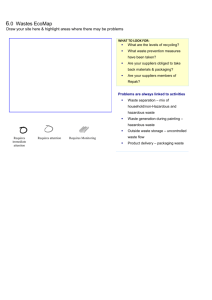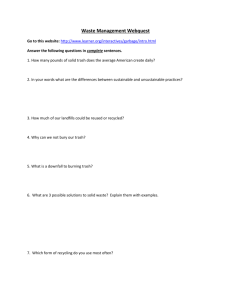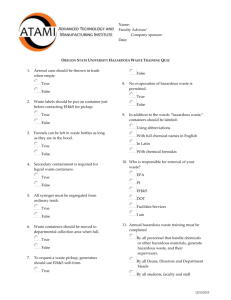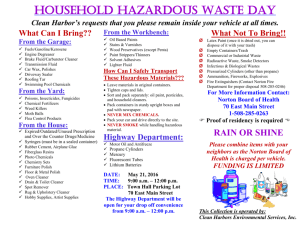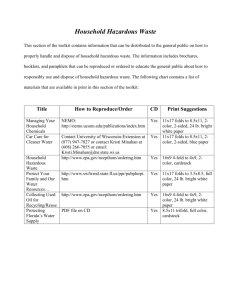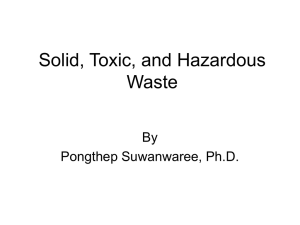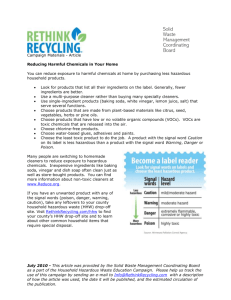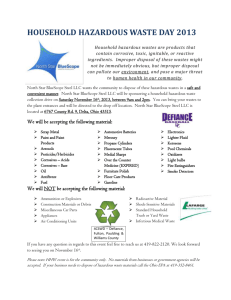Behavior change survey and report
advertisement
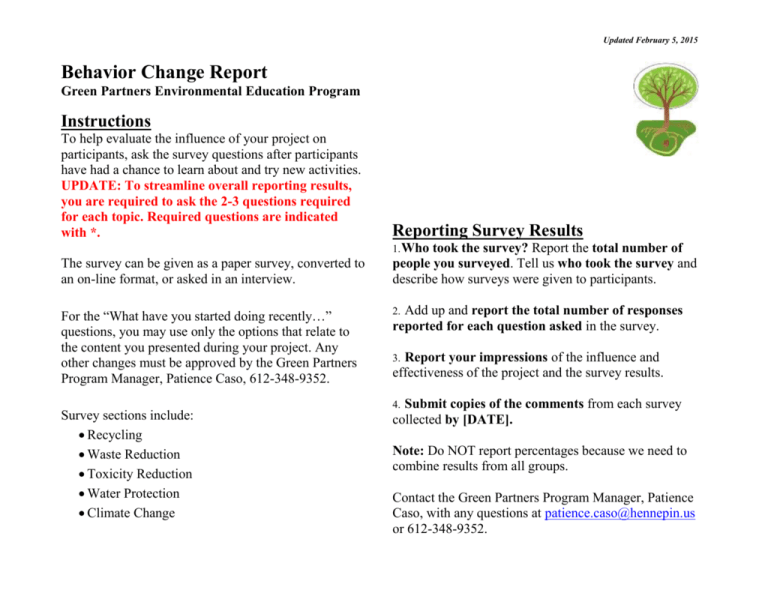
Updated February 5, 2015 Behavior Change Report Green Partners Environmental Education Program Instructions To help evaluate the influence of your project on participants, ask the survey questions after participants have had a chance to learn about and try new activities. UPDATE: To streamline overall reporting results, you are required to ask the 2-3 questions required for each topic. Required questions are indicated with *. Reporting Survey Results 1. Who The survey can be given as a paper survey, converted to an on-line format, or asked in an interview. For the “What have you started doing recently…” questions, you may use only the options that relate to the content you presented during your project. Any other changes must be approved by the Green Partners Program Manager, Patience Caso, 612-348-9352. Survey sections include: Recycling Waste Reduction Toxicity Reduction Water Protection Climate Change took the survey? Report the total number of people you surveyed. Tell us who took the survey and describe how surveys were given to participants. Add up and report the total number of responses reported for each question asked in the survey. 2. Report your impressions of the influence and effectiveness of the project and the survey results. 3. Submit copies of the comments from each survey collected by [DATE]. 4. Note: Do NOT report percentages because we need to combine results from all groups. Contact the Green Partners Program Manager, Patience Caso, with any questions at patience.caso@hennepin.us or 612-348-9352. Updated February 5, 2015 Survey Results - Narrative 1. Who took the survey? 2. Report the total number of people you surveyed. 3. Describe how surveys were given to participants. 4. Report your impressions of the influence and effectiveness of the project and the survey results. 5. Submit copies of the comments from each survey collected by February 29, 2016. Updated February 5, 2015 Recycling Please tell us about your recycling habits and share your thoughts about recycling. *Required questions in this section. 1. *Did you recycle before participating in this project? #Yes #No 2. *Do you currently recycle? #Yes #No 3. I believe I can make a positive difference in the world by recycling. #Yes #No #I don’t know 4. I feel a personal responsibility to recycle my waste. #Yes #No #I don’t know 5. Because of what I learned, I will recycle everywhere I can. #Yes #No #I don’t know 6. *Are you recycling anything NEW because of what you learned during this project? Yes or No 7. If you answered “yes”, please check the NEW items you STARTED recycling because of this project or workshop. # Plastic cups # Paper # Plastic bottles & jugs # Cartons # Plastic packaging # Cardboard # Glass bottles and jars # Plastic containers # Metal cans Updated February 5, 2015 Waste Reduction Please tell us what waste reduction actions you have taken and share your thoughts on waste reduction. *Required questions. 1. *What have you started doing recently because of what you learned during this project or workshop: Reduce food waste: # Pack a no-waste lunch using reusable containers, real silverware and cloth napkins. # Compost food scraps instead of throwing them in the trash or garbage disposal. # Reduce purchasing individually packaged food and single use products. # Reduce use and purchase of disposable dishes. Reduce household waste: # Donate usable clothes and household items instead of throwing them away. # Buy reusable school supplies, like refillable pencils, lunch boxes and reusable water bottles. # Buy clothing from thrift or reuse store. # Signed up to get off of junk mail lists. # Make toys, gifts or cards with reused items instead of buying new. Reducing waste on the go: # Use a reusable bag instead of taking paper or plastic at the store. # Avoid Styrofoam containers. # Bring my own refillable beverage container. Other: # Other, please describe: _____________________ 2. I feel a personal responsibility to reduce my waste. #Yes #No #I don’t know 3. I believe I can make a positive difference in the world by reducing the amount of waste I generate. #Yes #No #I don’t know 4. Because of what I learned, I will reduce the amount of waste I generate. #Yes #No #I don’t know 5. *If you have taken steps to prevent waste, is the change due to your participation in this project or workshop? # Yes # No # I already do this Updated February 5, 2015 Toxicity Reduction and Household Hazardous Waste Please tell us about your household hazardous waste and share your thoughts on the topic. *Required questions. 1. *What have you started doing recently because of what you learned during this project or workshop: # Identify hazardous items and products in my home. # Store hazardous items in original containers away from children, pets and flames. # Recycle CFL light bulbs, electronics, TVs, computers or cell phones at retailer – like your local hardware or electronics store. # Dispose of household hazardous waste at a Hennepin County drop-off facility or community clean-up event. # Prevent household hazardous waste by making non-toxic cleaners at home from safer ingredients like vinegar and baking soda. # Read product labels on cleaners and household products to find a less hazardous alternative. 2. I feel a personal responsibility to reduce and properly dispose of hazardous products in my home. #Yes #No #I don’t know 3. I believe I can make a positive difference in the world by reducing and properly disposing of household hazardous products. #Yes #No #I don’t know 4. Because of what I learned, I will reduce and properly dispose of household hazardous products. #Yes #No #I don’t know 5. *If you have taken steps to reduce household hazardous waste, is the change due to your participation in this project or workshop? # Yes # No # I already do this Updated February 5, 2015 Water Protection Please tell us about water in your yard or community and share your thoughts about your role in protecting water. *Required questions. 1. *What have you started doing recently because of what you learned during this project or workshop: Save water: # Install a water-saving shower head. # Take shorter showers. Direct rain water to your yard: # Redirect downspouts from hard surfaces to the yard or garden. # Install a rain garden to capture rainwater on your property. # Use native plants to direct more rainwater into the soil. Prevent water pollution: # Keep leaves, grass, and litter out of the street. # Adopt a storm drain on your block and clean out leaves, grass, and litter. # Reduce chemicals like herbicides, pesticides and fertilizers in your yard. # Keep pollutants like motor oil and paint out of the street and storm drain. 2. I feel a personal responsibility to protect the lakes, rivers and wetlands around my home. #Yes #No #I don’t know 3. I believe I can make a difference in protecting our water. #Yes #No #I don’t know 4. Because of what I learned, I will do what I can to protect and conserve water. #Yes #No #I don’t know 5. *If you have taken steps to prevent water pollution or conserve water, is the change due to your participation in this project or workshop? # Yes # No # I already do this Updated February 5, 2015 Climate Change Please share your thoughts on climate change and actions you have taken to reduce climate change pollution. *Required questions. 1. *What have you started doing recently because of what you learned during this project or workshop: Things you do at home: # Replace old light bulbs with energy efficient light bulbs. # Turn the thermostat down 2 degrees in winter/up 2 degrees in summer. # Grow your own food or eat food grown locally. # Compost my food waste. # Seal leaks around windows and doors at home. # Pay attention to and track energy use. # Unplug electronics that aren’t being used. # Wash clothes in cold water or hang clothing to dry. Changes to your home: # Have a home energy audit. # Replace old appliances with energy efficient appliances like refrigerators, furnaces and water heaters. # Add insulation to your home. # Install or sign up for clean energy sources like solar, wind or geothermal. Things you do on the go: # Use fewer fossil fuels by biking, walking or taking public transit. # Recycle at parks, businesses and other public spaces. 2. I feel a personal responsibility to do something to reduce climate change pollution. #Yes #No #I don’t know 3. I believe I can make a difference by reducing climate change pollution in my daily life. #Yes #No #I don’t know 4. Because of what I learned, I will do what I can to reduce climate change pollution. #Yes #No #I don’t know 5. *If you have taken steps to reduce your contribution to climate change pollution, is the change due to your participation in this project or workshop? # Yes # No # I already do this
